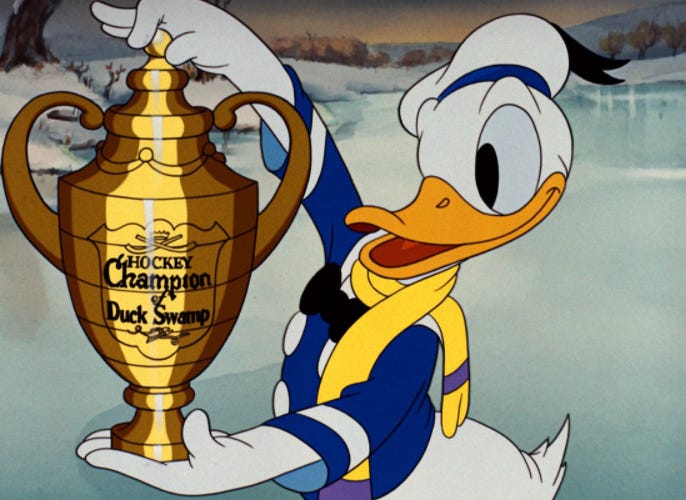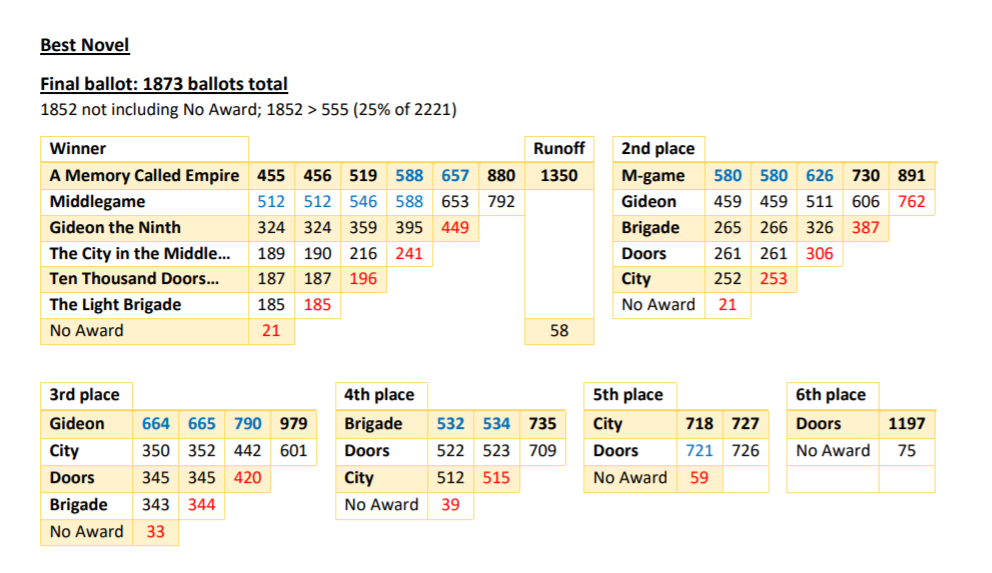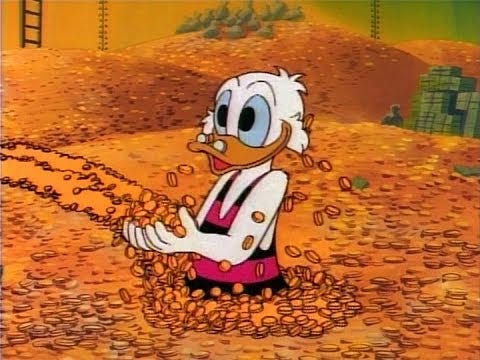Some Words about Awards
Looking at the similarities and (mostly) differences between SFF and literary world awards
Update 03/03/23: Since it is Hugo nomination time, I’ve unlocked this archived post about SFF and literary awards. And if you are a Hugo voter and need another novelette to nominate, please consider my Lightspeed novelette “Cale and Stardust Battle the Mud Gobblers of Hudson Valley.”
No time of the year produces more anxiety for writers than awards season. No matter how well or poorly your book sold, no matter how many raves or pans it got, awards can transform the trajectory of a book. A complete lack of award consideration might turn the book of the year into a flash in the pan while a surprise win can transform an overlooked book into a classic.
Of course, awards can also achieve little. Especially in the long term. Plenty of classic novels won none and plenty of winners are now completely forgotten. Still, it’s hard not to get your hopes up as an author and awards both confer real world benefits—cash money or else acclaim that can translate into teaching positions, book deals, etc.—and they both shape and reflect the ecosystems they operate in. In the case of the lit world and genre world, there are some fairly dramatic differences between how awards are run.
Judging or Voting
If you are like me and follow an equal number of literary and SFF authors on Twitter, there’s a marked difference in activity around the major awards. In the lit world, authors vague tweet about their hopes and fears. How they are crossing their fingers, hoping to be among the chosen. Meanwhile, the SFF authors will be actively lobbying for votes and listing out exactly which of their publications are eligible for which awards.
This is the first major difference in the awards: how the winners are chosen. In the literary world, all the major awards have a small panel of judges—typically around 3-5 acclaimed authors who don’t have books coming out year—who deliberate privately. The Pulitzer has a slightly weirder process in which said judges pass their three finalists to the Pulitzer board that then picks the winner. (This quirk has led to a couple instances in which the board refused to award any of the finalists, most recently in 2012.)
In the genre world, things are very different. The Hugo Award, the source of most lobbying, is voted on by attendees or supporting members of Worldcon. Last year, 2,221 SFF readers turned in ballots. It’s normally over 3,000 in non-COVID times. Three thousand people is only a fraction of the total SFF readership, but it is dramatically more voters than the 3-5 judges. (The biggest voting pool I know of in the lit world is the NBCCs, which have a rotating group of only 24 voters.) The Hugo’s public-yet-not-massive vote means not only does it more actively represent the readership, for better or worse, but it is also subject to manipulation attempts such as the infamous rabid puppies and sad puppies scandals.
Outside of the Hugo, several major SFF awards have smaller but still large voting pools. The Nebulas are voted on by the members of the SFWA (Science Fiction and Fantasy Writers of America), which has about 2,000 members—although certainly all of them don’t vote. The World Fantasy Award is voted on by attendees of the World Fantasy Convention, which typically has around 800 attendees. The Locus Award allows anyone to vote, although subscribers to the magazine get their votes counted twice. If you are a serious SFF reader or SFF insider, then voting on ballots is a regular part of your fandom. There’s simply nothing like that in the literary world.
There are many many SFF awards (just as there are many many literary awards) and some notable ones do operate with a small panel of judges, such as the Arthur C. Clarke Award. But the large voting pools of the Nebula, Hugo, and other major awards are a fascinating difference.
Secrecy vs. Transparency
An extension of the above processes is that the literary world awards are secretive while awards like the Hugos are very public. I don’t mean secretive in a bad way. I mean that the judges take the process very seriously and try to avoid any whiffs of influence or impropriety. For example, judges at major awards can be asked not to blurb or even publicly praise books published the year they’re judging.
Some literary awards, like the National Book Award, announce longlists (typically 10 books) followed by shortlists (typically five) followed by the winner. Others, like the Pulitzer, announce the winner and the two runners-up simultaneously. Either way, authors don’t know who is going to win and have no clue—before or after—how close they came.
It’s quite different with an award like the Hugo, where rounds of ballots are sent to voters. The Hugos are remarkably transparent, posting the exact totals for every round of every award. Here, for example, are the voting totals for last year’s Best Novel:
Especially in smaller awards, an author can know that a single vote might have changed things. Here’s the 2020 nomination round for Best Novelette (again: a long short story) where one vote separated the last finalist from the first runner-up:
Which way is preferable depends entirely on the author’s constitution. Would you rather know exactly how close (or how far) you came from winning? Or would you rather be free to imagine what you want: that you never had a chance (and thus are happy just to be nominated) or that you could have easily won (if only those pesky judges had understood your genius better)?
Money, Money, Money… or Lack Thereof
As a general rule, the genre world is more professional with an admirable insistence on paying writers. Every SFF magazine pays with per word rates, for example, while many major lit mags offer nothing but contributor copies. However, this is not the case when it comes to awards.
Most major SFF awards like the Hugos and Nebulas come with no cash prize. A few have small honorariums. The Arthur C. Clarke comes with a cheeky award payout based on the year aka £2,021 in 2021. The Philip K. Dick Award pays out $1,000.
In the literary world, winning an award can come with significant financial rewards. The Pulitzer’s give out $15,000. The National book Award pays $10,000. The Story Prize pays $20,000. The Pen/Faulkner $15,000. And there are a whole bunch of annual literary awards with even more serious money amounts. The Whitings are given to around 10 writers each year and each get $50,000. The Kirkus Prize gives $50,000 in each category. The Booker is a whooping £50,000. The Pen/Jean Stein Award purse is $75,000! To say nothing of the Nobel (over one million US dollars) or the MacArthur genius grants ($625,000).
Why is this the case? I think it mostly comes down to the literary world simply getting more money from major donors and foundations, and then those foundations often giving out the awards. Many of these awards have the express purpose of financially supporting authors and allowing them to create art without commercial pressure. On the flip side, the genre awards are typically given out by conventions or professional groups like the SFWA. Perhaps it would seem weird for members to be paying themselves out of membership dues. In any event, winning major genre awards can of course help with selling books, getting gigs, and so on. So winning them is still, of course, a great thing!
A Few Awards or a Cornucopia of Categories?
Another massive difference between the big SFF and literary awards are categories. In short: the lit award have only a few and the genre awards have a whole bunch!
Literary Awards:
The Booker is given in one category: Fiction
The International Booker is one: Translated Fiction
The Story Prize is given in one category: Story Collection
The Pen/Faulkner is one: Fiction
The Pulitzer has six literary awards: Fiction, Drama, History, Biography/Autobiography, Poetry, General Non-Fiction.
The National Book Award is given in five categories: Fiction, Nonfiction, Poetry, Translated Literature, Young People’s Literature
Basically, literary awards go to single large categories: fiction, poetry, drama. For some reason I don’t fully understand, there are a few awards like the Pulitzers and NBCCs that split nonfiction into multiple categories… yet this is basically never done to fiction or poetry unless it’s about eligibility (foreign vs. American authors) or children’s literature versus adult literature.
SFF Awards:
By contrast, the major SFF all have lots of categories.
The Hugo Award has 15 active categories. The World Fantasy Awards have 10. The Nebulas have 8. The Locus Awards have 16. The number of awards is especially notable as none of those have categories for poetry and there are only a few nonfiction awards. Mostly, this is multiple fiction awards. The categories themselves fall into three broad groups.
The first, and biggest, is different fiction awards. The SFF awards tend to have some combination of the following: novel, short story, novella, novelette (a long short story), story collection, series, anthology, graphic story, movie/tv script, and video/board game writing. No award has all of those, but they each have a bunch of them. Some awards also separate genres: best horror, best science fiction, best fantasy, etc.
The second major group are what we might call publishing-side awards: editor, artist, publisher, magazine.
The last group—and these are most prominent in the Hugos—are the fan awards: fan artist, fan writer, fanzine, fancast.
Winners and Losers and Consequences
All of the differences above are less interesting in themselves than they are for what effects they have. Who wins? Who are finalists? What does winning do for an author? What consequences does this have for fandom, careers, and the whole ecosystems?
The consequences of the categories are what you’d expect. The many genre award categories mean most popular authors end up with a whole bunch of them over their careers. It is fairly rare for an acclaimed or popular SFF author to not rack up at least a couple Hugos or Nebulas over a career, even if they never win the big one (Novel). In contrast, many of the most acclaimed fiction writers never won a Pulitzer or NBA and often never even become finalists.
The emphasis on fan awards helps curate the SFF fandom, and the emphasis on professional awards gives real prominence to SFF professionals. I think many SFF readers could name editors they love, for example, while most literary readers wouldn’t have a clue.
On the other hand, the literary world’s emphasis on poetry awards helps make poetry a much more prominent part of the literary world. And the limited number of categories makes winning the Pulitzer or Booker or NBA a really notable, often career-changing event. Even being a finalist for one of those awards can completely change a career in the way that, say, being fifth place in Best Novelette (SFF jargon for a long short story that’s not quite a novella) will probably not.
Who Wins? And Who Wins Again and Again?
What about who wins these awards? What consequences are there for having a large voting pool vs. a small group of judges? For the next two sections, I’m going to focus on the big boy: novels. (Technically the Pulitzer/NBA/etc. awards for “Fiction” can go to story collections but that only rarely happens. For the most part, those awards are novel awards.)
The literary awards are, bluntly, far more surprising. Your very popular Goldfinches and All the Lights We Cannot Sees do often win, but there are also frequently utter surprises. Perhaps the most famous recent example of this is Paul Harding’s Tinkers, which had sold barely any copies at all before winning the Pulitzer in 2010. There are many other novels that were on small presses, overlooked by reviews, or simply not selling well that won major literary awards. Literary judges often pride themselves on promoting an underrated masterpiece.
Unsurprisingly, the SFF awards tend to skew toward popular authors and popular books. Many Hugo and Nebula voters take their voters very seriously and read many books, but—especially in the nomination round—you can’t expect hundreds or thousands of people to sift through as many books as a small dedicated set of judges.
Popular authors also tend to contend over and over. This can easily be seen by the list of multiple winners. Many SFF writers have won the Hugo for Best Novel multiple times. You have 6/12 (wins/nominations) for Heinlein and 4/10 for Bujold. Five different authors have won three times and nine have won twice. There is nothing like that in the Pulitzer. No author has won three, four, or six Pulitzers. Only four have won twice: Booth Tarkington, William Faulkner, John Updike, and Colson Whitehead. This is despite the fact that the Pulitzers have been around since 1918 and the Hugos only since 1953. (This pattern is a little less prominent in other, newer awards, but still there.)
It’s fair to note that SFF perhaps has a smaller pool of books to choose from, since at least theoretically the literary awards are drawn from all of literature. But if the literary world is as narrow and parochial as many SFF fans contend then you’d expect to see that in the rewards.
As with almost everything I discuss here, there are arguments for both ways of doing things. In the genre side, the titans of the genre can be adequately reflected in the awards. A monumental work like N.K. Jemisin’s Broken Earth trilogy—truly one of the best fantasy series of modern times, which I’ve written about a bit here before—can even win three times in a row . That would simply never happen in the literary world, no matter how deserving. And one could certainly argue that the awards more accurately reflect the tastes of readership.
This can be a downside too, since biases and prejudices are also reflected. Before N.K. Jemisin won in 2016, no black author had ever won the Hugo for best novel. If you had died before 2015, when Cixin Liu won, you would have never witnessed a POC win the Hugo. It was hardly perfect in the lit world, but you did have Ralph Ellison, Alice Walker, Toni Morrison, Ha Jin, Jesmyn Ward, Junot Díaz, Jhumpa Lahiri, and others winning NBAs and Pulitzers. It’s about the same for gender. Ursula K. Le Guin was the first woman to win a Hugo for Best Novel in 1970. (Ditto the Nebula, although that had only started in 1966.) By that time, dozens of women had won the Pulitzer and/or National Book Award.
All of that said, both the lit world and SFF world have been far better on the diversity front in the last five to ten years than they have been historically. Hopefully that will continue.
(The Lack of) Award Overlap
Here we get to the central question of series: why don’t the two ecosystems overlap more?
Even in a time in which the genre barriers are increasingly breaking down there is surprisingly little intermingling. In the last decade or so, the lit awards have become far more open to SFF works. Marlon James’s Black Leopard, Red Wolf, Colson Whitehead’s The Underground Railroad, and Emily St. John Mandel’s Station Eleven, for example, where all finalists or winners of Pulitzers and NBAs. But those novels did not contend for the Hugo, Nebula, or World Fantasy Award.
Historically it hasn’t been any better. Jonathan Lethem once wrote an interesting piece (that caused some bitter backlash) about this topic. He discussed what it would have been like if the Nebulas and Hugos had given awards to authors like Pynchon, Barthelme, and Coover. What if the genre world had reached out to bridge the divide? What would the history of SFF and literary fiction look like? Today, I frequently see SFF authors claim that any literary world writer who writes outside of realism—any fabulist, postmodernist, or surrealist—“counts” as SFF. That’s a debate for another newsletter, but suffice to say the SFF awards have never reflected this.
The only “literary world” author I can think of to compete for (and in this case win) a Hugo or Nebula was Michael Chabon in 2008. The somewhat understandable hostility —given the long history of literary world snobbery toward SFF—for literary world authors extends even to authors who are firmly SFF with histories in the field, but who are published by literary presses like FSG, Coffee House Press, or Riverhead. A quick scroll through the Nebula or Hugo finalists shows presses like those never appear, though they are doing some excellent SFF work IMHO.
I’m not only faulting the SFF side here. The literary world does not do a good job marketing to SFF readers or promoting authors in that world. And the literary awards also don’t pull from SFF imprints. All of the novels I mentioned above—as well as other recent NBA/Pulitzer finalists like Carmen Maria Machado’s Her Body and Other Parties and Kelly Link’s Get in Trouble—were published by literary world presses. The different ecosystems means that publishers, publicists, and reviewers often don’t know much about the other world. And, frankly, many don’t care to try to learn.
I do have to give a major shoutout here to the exception: the Arthur C. Clarke Award. This British SFF award has gone to the aforementioned Whitehead and Mandel, as well as authors like Namwali Serpell. There’s also a much greater presence of literary world imprints among finalists. I don’t think it is a coincidence that the Clarke award is judged instead of voted on. Although perhaps also the conceptions of what counts as SFF and what counts as literary are different in the U.K. I’m not sure. Another award worth mentioning here is the Shirley Jackson Award, which does a good job pulling from both worlds.
My own hope though is that we soon see these barriers fully break down. That N. K. Jemisin can compete for a Pulitzer while DeLillo is up for a Nebula. (Replace Jemisin and DeLillo with whatever stellar SFF writer and genre-bending literary writer you wish.)
Maybe that future is on the horizon…










Jonathan Strange & Mr Norrell was the rare crossover: https://en.wikipedia.org/wiki/Jonathan_Strange_%26_Mr_Norrell#Awards_and_nominations